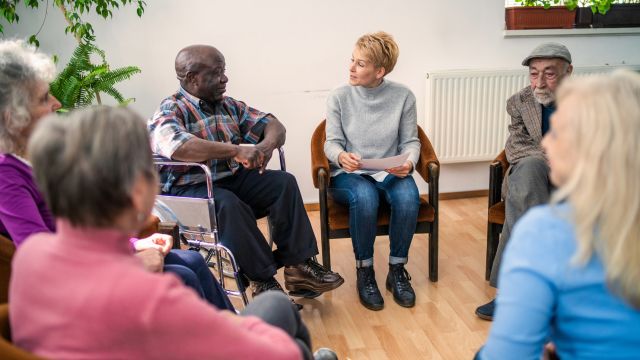Updated on August 13, 2024
Myelofibrosis (MF) is a type of cancer that affects the bone marrow and the body’s ability to produce healthy blood cells, including red blood cells, white blood cells, and platelets (blood cell fragments that cause clotting when there is an injury). People with MF can experience a variety of complications and symptoms, including lowered immunity, anemia, enlarged spleen, enlarged liver, fatigue, unintended weight loss, fever, night sweats, and bleeding.
Most cases of MF are not curable, and treatment focuses on easing symptoms, addressing complications, and improving quality of life. In cases where MF is causing no symptoms or few symptoms and is progressing slowly, treatment may only involve monitoring. For cases that are intermediate or high risk, treatment can include immunotherapy drugs, chemotherapy, treatment for anemia, and—in some cases—stem cell transplantation. MF is a different experience for everyone, and everyone’s treatment plan will be at least a bit different.
MF and mental health
Like any type of cancer, living with myelofibrosis can have an impact on a person’s mental and emotional health. There is the stress and uncertainty about test results and treatment decisions. There are medication side effects and the out-of-pocket costs of treatment. There is the persistent fatigue that often occurs when blood cell counts are not at healthy numbers.
For these reasons—and many others—people living with MF are encouraged to make mental health a priority in their treatment.
Building your support network
Living with any type of cancer can be an isolating experience. While MF is a different experience for every person, it is not an experience a person should go through alone. Connecting with others and building a support network can improve your quality of life and mental health while living with cancer. Here are some places to get started:
- Your healthcare team. Improving quality of life is an important goal of treatment. If you are struggling with difficult thoughts or emotions, tell your healthcare providers. They can suggest strategies and steps to help, such as working with an oncology social worker or other type of counselor.
- Friends and family. Loved ones can be a valuable source of support when living with a chronic illness. Support can mean different things at different times. It may mean help with meals or errands when you are dealing with fatigue or treatment side effects. It may be a relative to call when you need to talk to someone about your diagnosis. It may mean having a friend to spend time with when you want a break from thinking about MF.
- Support groups. Support groups meet online and in person, and offer the chance to connect with other people who are living with MF or other similar diseases. Hospitals and cancer centers may have information about local support groups.
What to talk about
For many people, mental health isn’t the easiest topic to talk about. Feelings, moods, and emotions can be difficult to put into words. If you want to talk, but are not sure what to say, here are some questions you can think about:
- How has MF affected your day-to-day life?
- What has become more difficult because of MF?
- What does MF prevent you from doing?
- Do you feel your diagnosis has affected your relationships?
- Are you experiencing fatigue, pain, other types of discomfort, or other symptoms?
- Are you having difficulty concentrating?
- How often do you experience low moods, anger, or sadness?
- How often do you feel stressed or anxious?
- Do you have concerns or doubts about your diagnosis, test results, or treatment?
- Are you concerned about the cost of treatment?
When it comes to any cancer diagnosis, know that there is no right way or wrong way to feel. If you are having trouble describing your experience, you can also try writing in a journal, which may help you better understand what you want to say and how you can say it. Having notes in front of you can also be helpful when talking to a healthcare provider or counselor.



